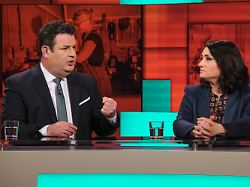Specialist talk at Klamroth
“We don’t want immigration into social systems”
By Marko Schlichting
1/17/2023 3:24 am
There is a shortage of skilled workers in Germany. The federal government wants to change that with a law. In the program Hart aber fair on ARD, a heated discussion broke out on Monday evening. The main focus here is on German language skills among people who have nothing to do with the labor market.
Germany has a problem: there is a lack of skilled workers on the labor market. The guests at Hart but fair will discuss this on Monday evening on ARD. Right at the beginning of the program it is about the current problem of skilled workers in the federal government. A Secretary of Defense is wanted. One of the possible candidates for this post is a guest on the show: Federal Labor Minister Hubertus Heil. Moderator Louis Klamroth uses this opportunity to ask the minister about his ambitions.
However, Heil refuses to engage in any discussion: “As Labor Minister, I still have a lot planned,” he says. “The chancellor will announce tomorrow who will succeed Minister Lambrecht.” By “tomorrow” he means this Tuesday. Scholz will make a good decision, but not on talk shows. He himself does not feel underutilized as Labor Minister. But everyone can rely on the fact that the traffic light coalition is also capable of acting in this policy area. “Because that’s what matters in the end.”
After that is clarified, the actual topic is discussed. Things have been quiet for a long time, except for Bavaria’s interior minister, Joachim Herrmann. The CSU politician is already in campaign mode, which will ultimately lead to a comparatively unnecessarily heated discussion. It is about the German language skills of migrants. And that’s when Bavaria’s mind gets excited. It starts with the topic of dual nationality, but even more so with a part of a law that the interior and labor ministries have drawn up. It stipulates that the German language tests should be made easier for people aged 67 and over who are naturalized.
Although they will not eliminate the shortage of skilled workers in Germany, Herrmann is all the more upset about the regulation, in which the federal government is thinking above all of people who came to Germany in the 1960s as “guest workers” and spent 50 years paying taxes and taxes have paid taxes. At that time there were no German language courses. But these people have had 50 years to learn the language, Herrmann fumes. In the end, the discussion flattens out to such an extent that one wishes future professionals hadn’t seen it.
Cabinet wants to pass immigration law
But first the talk is factual. Labor Minister Heil explained the well-known problem: Germany has full employment, but in the next few years baby boomers, i.e. those people who were born in the 1960s, would reach retirement age. Then there will be too few workers in many places. That’s why Heil wants to get people without school qualifications into training. He is also planning a new arrangement for educational leave for employees. The long-term unemployed are to be reintegrated into everyday working life, and women are to be convinced of the possibility of full-time work. “But none of that will be enough. We also need qualified immigrants,” says Heil. The Federal Employment Agency assumes up to seven million. Heil: “There’s a lot to do. We need a lot of people, helping hands and bright minds.”
Freedom of movement within the European Union has already helped a lot. But many people come to Germany from third countries looking for work. They want to support salvation.
But, the Bavarian Minister of the Interior interjects into the discussion, “There are also a lot of people here who are here illegally and obviously don’t want to work. We also have to ensure that those who are here illegally and don’t work, our leave the country again.” Applause from the audience, which is just as divided as the opinions expressed that evening.
There is Lamya Kaddor, German-Syrian, Islamic scholar, founding chairwoman of the Liberal-Islamic Association and member of the Green Bundestag. She is primarily interested in people who want to work and criticizes Germany’s unattractiveness. Heil can feel that. That is why the traffic light coalition wants to introduce a new immigration law. First of all, the current immigration law for skilled workers must be “purified”. To do this, the hurdle for immigration must be lowered. “We not only need specialists in the sense of academics, but also qualified craftsmen.”
Furthermore, Heil demands a move away from the “arrogance of the German education system”. For him this means that professional qualifications from other countries must also be recognized in Germany. Eventually, Heil wants to introduce a points system that people who want to work in Germany can use to get a “chance card.” It is valid for one year. Anyone who hasn’t found a job after that has to leave, says Heil. “We don’t want immigration into social systems, we want immigration into the labor market.”
“We want to buy a house”
An Iranian couple shows how immigration and integration can work. The two are guests on the show. They got their bachelor’s degree in Iran and were nurses. They came to Germany through a program at the Asklepios clinics and work as nursing staff in Hamburg. They learned some German in Iran. In Hamburg colloquialism was added. The couple has been living in Germany for two years. Now it wants to buy an apartment or a house.
The spouses do not get a loan. To do this, they need a permanent residence permit. You get it after four years. It takes them too long. They say they are integrated, their colleagues have taken them in. They don’t like the fact that they have to wait years for their loan. But they want to be patient. For them, Germany has become their second home.
